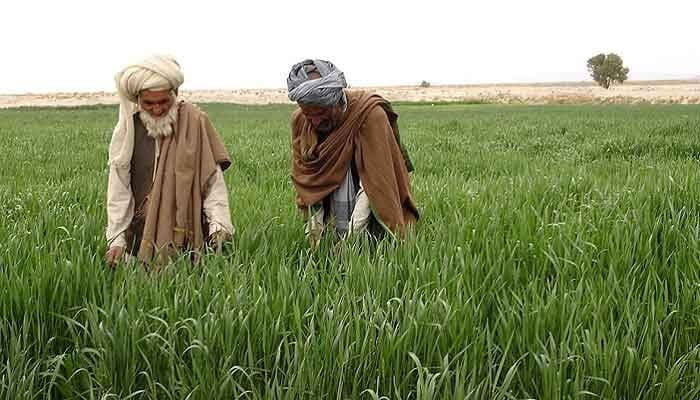Provinces agree to hike agriculture income tax: Aurangzeb
Finance czar says talks on IMF bailout programme progressing positively, deal likely to be finalised by July end
ISLAMABAD: Pakistan and the IMF have agreed that all the four provinces will amend their agriculture income tax rates to align with the federal rates of personal income tax and corporate tax by the end of October 2024, as part of the proposed structural benchmark.
Under the IMF’s structural benchmark, each province has committed to implementing the amended income tax rates as of January 1, 2025. Additionally, it was agreed under IMF conditions that if any province faces challenges in collecting agriculture income tax, the Federal Board of Revenue (FBR) will collect it on its behalf until it can build its capacity.
According to an official communication from one provincial government to the federal Ministry of Finance, the revised text of the Memorandum of Financial and Economic Policies (MEFP) was shared for approval. The IMF’s drafted MEFP outlines the directive that the four provinces will amend their agriculture income tax regimes through legislative changes to fully align with the federal personal income tax (for small farmers) and corporate income tax (for commercial agriculture) regimes by the end of October 2024.
The exemption on income from livestock activities will be removed. Each province will commence the collection of agriculture income tax under the new regime from January 1, 2025. In case of initial implementation challenges, the provinces have agreed to request the FBR collect agriculture income tax on their behalf while they enhance their revenue collection and administration capacities. This alignment of income tax regimes aims to enhance the fairness of the tax system by ensuring that income from agriculture is taxed equivalently to other forms of income.
Moreover, the provinces have agreed to transition from a positive list to a negative list approach for the services GST starting at the beginning of the fiscal year 2026. This strategic shift is intended to improve transparency and reduce tax evasion loopholes by subjecting all items not explicitly exempt to taxation. Punjab has conveyed its concurrence to amend agriculture income tax and provincial sales tax on services, as approved by the provincial cabinet in its 11th meeting held on July 9, 2024.
Meanwhile, Finance Minister Mohammad Aurangzeb has said that the provinces have agreed in principle to hike the agriculture income tax. “We have consulted with the provinces, and they are okay with it,” he said.
Ruling out any condition of the IMF for restructuring Chinese debt, the finance minister said that the size of the IMF programme would be ascertained next week, ranging over $6 billion under the Extended Fund Facility. “We have almost completed all prior actions, and it is hoped that the staff-level agreement will be finalised during this month,” Aurangzeb said while talking to journalists after concluding the National Assembly Standing Committee on Finance meeting under the chairmanship of PPP leader Syed Naveed Qamar at the Parliament House on Thursday.
The minister said the IMF wants to tax actual income, which is correct. He also mentioned that there is pressure on the government from all sectors regarding the tax issue and added that nobody wants to pay taxes. The outstanding bilateral loans and IPPs from China stood in the range of $35 to $37 billion, with the IPP loan hovering around $15.4 billion. Mohammad Aurangzeb was expected to visit China this month, but it got delayed owing to the Chinese leadership conference from July 15 to 18, 2024.
Pakistani authorities wish to explore the possibility of securing an extension in the Chinese IPP debt by staggering the repayment period from 2036 to 2041. In this way, the electricity tariff might be brought down, but it seems quite hard to convince the Chinese private sector to restructure its outstanding obligations.
Earlier, Chairman of the NA panel Syed Naveed Qamar granted permission for an in-camera briefing by Secretary Finance Imdadullah Bosal on the main contours of the IMF programme. Qamar told journalists that the request for an in-camera session was made by the Finance Division. For all practical purposes, the chairman of the NA panel again rescued the government by curtailing direct access to the media.
On the question of augmentation of the EFF programme through the Resilient and Sustainability Facility (RSF), he said that it was discussed with the IMF, and they agreed in principle to decide on the occasion of the first review of the upcoming EFF programme. He said that Pakistan was expected to strike the Staff-Level Agreement this month. He thanked the four chief ministers for extending cooperation on imposing tax on agriculture income. He said the government had selected five ministries for rightsizing, and an announcement to this effect would be made by the end of July 2024. It would be a revolving process, so more ministries would also be selected for rightsizing gradually, he added.
On pension reforms, Aurangzeb said that the defined contributory pension was introduced for civil servants with effect from July 1, 2024, while for armed forces, it would be implemented from July 1, 2025. He called for the overhaul of military pensions and said they were reviewing their service structure as army officers who retire earlier (than civil servants). He said the government had brought real estate and retailers into the tax net, and now agriculture income would be brought into the tax net by the provinces.
Federal Secretary of Finance Imdadullah Bosal informed the NA panel that the country would continue to undergo a stabilisation mode as the economy improved in the aftermath of the SBA programme and now the fresh fund programme would consolidate the stabilisation. The stabilisation indicates tight fiscal and monetary policies would continue to persist under the IMF programme. On fiscal imbalances, he said that the fiscal deficit might hover around Rs7,849 billion or 7.4 percent of GDP by the end of the current fiscal year, although the fiscal numbers were not yet finalised, which would be brought down to Rs283 billion, equivalent to 5.9 percent of GDP.
On unemployment, he said that the Pakistan Bureau of Statistics could not conduct the Labour Force Survey due to the population census exercise, but the IMF projected unemployment at eight percent, ILO at 8.2 percent and World Bank at 10.3 percent.
-
 Brad Pitt Feeling Down In The Dumps After Kids' Snubs As Pals Continue To Paint Angelina Jolie A Villain
Brad Pitt Feeling Down In The Dumps After Kids' Snubs As Pals Continue To Paint Angelina Jolie A Villain -
 Ex-PM Speaks Out On Andrew Mountbatten-Windsor In Newspaper Column
Ex-PM Speaks Out On Andrew Mountbatten-Windsor In Newspaper Column -
 Eric Dane Remembered In Glowing Tribute By Trans Activist In 'Grey's Anatomy'
Eric Dane Remembered In Glowing Tribute By Trans Activist In 'Grey's Anatomy' -
 Zach Braff, Sarah Chalke Explain J.D. And Elliot Twist In 'Scrubs' Revival
Zach Braff, Sarah Chalke Explain J.D. And Elliot Twist In 'Scrubs' Revival -
 Jim Carrey's Death To Body Double: Comedian's Latest Appearance Sparks Conspiracy Theories
Jim Carrey's Death To Body Double: Comedian's Latest Appearance Sparks Conspiracy Theories -
 Aespa's Ningning Steals Spotlight With Hilarious Viral Video From Milan Fashion Week
Aespa's Ningning Steals Spotlight With Hilarious Viral Video From Milan Fashion Week -
 Should Benedict Be Forgiven For Mistress Question? 'Bridgerton' Star Yerin Ha Reveals
Should Benedict Be Forgiven For Mistress Question? 'Bridgerton' Star Yerin Ha Reveals -
 John F. Kennedy Jr. Wife Carolyn Bessette's Last Minute Bridal Crisis Revealed
John F. Kennedy Jr. Wife Carolyn Bessette's Last Minute Bridal Crisis Revealed -
 Mary Cosby Remembers Son Robert Cosby Jr. After His Tragic Death
Mary Cosby Remembers Son Robert Cosby Jr. After His Tragic Death -
 Prince Harry, Meghan Markle Face 'largely Unfair' Criticism After Jordan Trip
Prince Harry, Meghan Markle Face 'largely Unfair' Criticism After Jordan Trip -
 Priscilla Presley Makes Sweet Confession About TV Role: 'I Lied'
Priscilla Presley Makes Sweet Confession About TV Role: 'I Lied' -
 Prince Harry Feels 'hurt' For Archie, Lilibet
Prince Harry Feels 'hurt' For Archie, Lilibet -
 Keith Urban, Nicole Kidman's Daughters Choose One Parent To Side With
Keith Urban, Nicole Kidman's Daughters Choose One Parent To Side With -
 Sarah Ferguson's Hidden Trait Exposed As Expert Dismantles Shadow Side To Her Personality
Sarah Ferguson's Hidden Trait Exposed As Expert Dismantles Shadow Side To Her Personality -
 Sarah Ferguson Backed By Powerful Friends Amid Epstein Fallout
Sarah Ferguson Backed By Powerful Friends Amid Epstein Fallout -
 PINK’s Latest Move Sparks Speculations About Replacing Major Celebrity On Show
PINK’s Latest Move Sparks Speculations About Replacing Major Celebrity On Show




